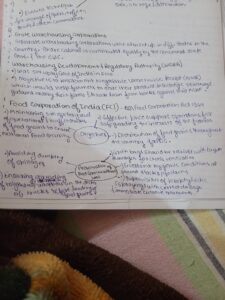Roadmap for Answer Writing Introduction Objective: Start with an overview of the role of PDS in India and the importance of FCI in this system. Key Points: Briefly explain the significance of PDS in ensuring food security for vulnerable populations. Mention the pivotal role of ...
Model Answer Impact of Digitization on the Public Distribution System (PDS) in India The digitization of India's Public Distribution System (PDS) has emerged as a crucial solution to the long-standing challenges faced by the system, such as bogus beneficiaries, food grain leakage, and inefficient taRead more
Model Answer
Impact of Digitization on the Public Distribution System (PDS) in India
The digitization of India’s Public Distribution System (PDS) has emerged as a crucial solution to the long-standing challenges faced by the system, such as bogus beneficiaries, food grain leakage, and inefficient targeting of subsidies. The integration of technology in PDS operations has resulted in significant improvements:
- Authentication of Beneficiaries
Through digitization, the PDS has addressed the issue of bogus beneficiaries. The Aadhaar seeding of ration cards ensures that subsidies reach only eligible individuals. As of 2020, about 4.39 crore ineligible or bogus ration cards were removed through this process, enhancing the credibility of the system (Ministry of Consumer Affairs, Food & Public Distribution). - Reduction of Leakage and Diversion
The introduction of online allocation of food grains and computerization of the supply chain has minimized pilferage and diversion. Real-time tracking, including the use of GPS to monitor trucks transporting food grains, has increased transparency in the system, ensuring grains reach the intended beneficiaries. - Enhanced Operations at Fair Price Shops
The deployment of electronic Point of Sale (ePoS) devices in over 92% of fair price shops has streamlined operations, reducing manipulation of records and improving the beneficiary experience by enabling biometric identification. - Interoperability of Benefits
The ‘One Nation One Ration Card’ (ONORC) scheme, which allows beneficiaries to access their entitlements across states, addresses the challenges faced by migrant populations. This national portability ensures that no individual is excluded from benefits.
Potential of the SMART-PDS Initiative
The SMART-PDS initiative, launched to modernize and reform the PDS, offers additional benefits:
- Automation of Operations
The use of automated grain analyzers for precise measurement and reduced human intervention will improve system transparency, reduce errors, and prevent biases. - Integration of AI and Data Science
The application of AI and data science, such as the Public Systems Lab (PSL) at IIT Delhi, will optimize supply chain logistics, detect fraud, and improve efficiency. - Overcoming Technological Limitations
SMART-PDS aims to address state-level technological constraints, enhancing the IT infrastructure and capacity at the local level.
By fostering transparency, accountability, and efficiency, SMART-PDS can contribute significantly to the achievement of SDG-1 (ending poverty) and SDG-2 (zero hunger).
See less



Model Answer Introduction The Public Distribution System (PDS) is a crucial mechanism for ensuring food security in India, especially for vulnerable populations. The Food Corporation of India (FCI) plays a vital role in the procurement, storage, and distribution of food grains under PDS. Reforms inRead more
Model Answer
Introduction
The Public Distribution System (PDS) is a crucial mechanism for ensuring food security in India, especially for vulnerable populations. The Food Corporation of India (FCI) plays a vital role in the procurement, storage, and distribution of food grains under PDS. Reforms in FCI have significantly improved the efficiency of PDS and strengthened food security for millions.
Reforms in FCI and Their Impact on PDS Efficiency and Food Security
1. Targeted Approach
2. Digitization
3. End-to-End Computerization
4. Buffer Stock Management
5. Decentralization
6. Fortification and Nutrition
7. Online Monitoring and Transparency
8. Supply Chain Optimization
9. Single Window System
Way Forward
- Improve Beneficiary Identification: Continue refining the identification mechanisms to ensure that food subsidies reach only the most deserving individuals.
- Strengthen Supply Chain Infrastructure: Invest in modern storage and transportation facilities to reduce wastage and ensure timely delivery.
- Enhance Nutritional Diversity: Incorporate more nutritious food items like protein sources and fruits in PDS to address malnutrition.
- Flexible System: Ensure the PDS can adapt quickly to changing conditions, such as economic shifts or natural disasters.
See less